
[ad_1]
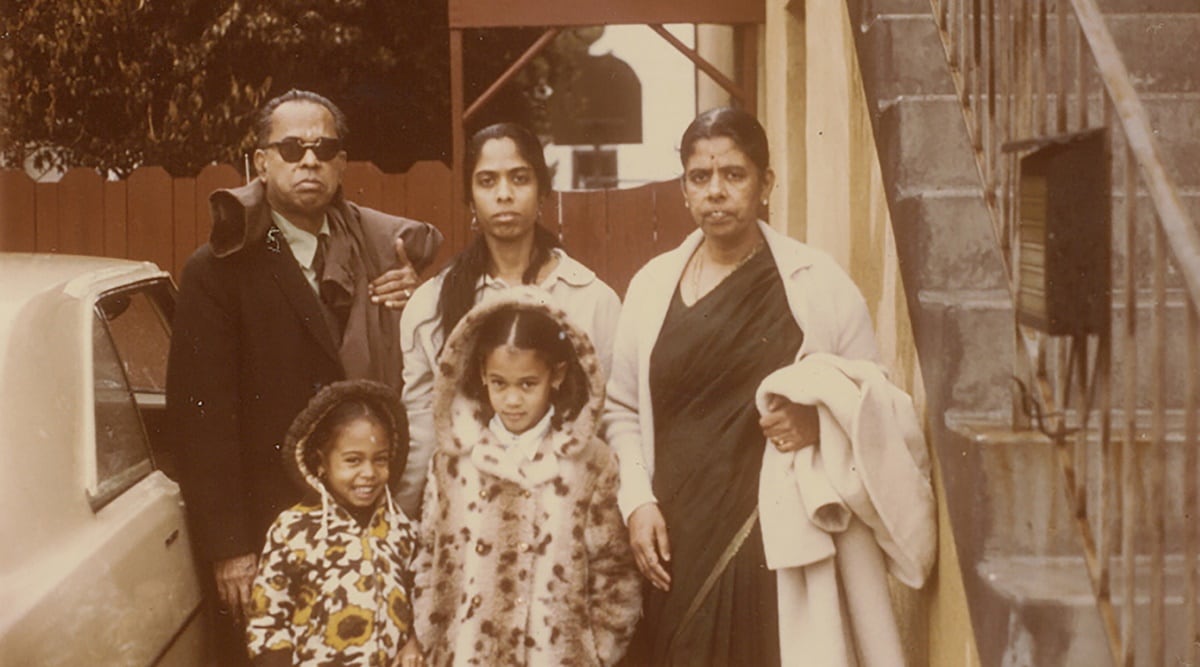 In an image provided by the Joe Biden campaign, Kamala Harris, front center, with, from left, her grandfather, P.V., sister, Maya, mother, Shyamala Gopalan, and grandmother, Rajam Gopalan, in 1972. (Joe Biden campaign via The New York Times)
In an image provided by the Joe Biden campaign, Kamala Harris, front center, with, from left, her grandfather, P.V., sister, Maya, mother, Shyamala Gopalan, and grandmother, Rajam Gopalan, in 1972. (Joe Biden campaign via The New York Times)
Written by Ellen Barry
At an off-campus space at the University of California at Berkeley in the fall of 1962, a tall, thin Jamaican doctoral student addressed a small crowd, drawing parallels between his native country and the United States.
He told the group, a roomful of Black students, that he had grown up observing British colonial power in Jamaica, the way a small number of whites had cultivated a “native Black elite” in order to mask extreme social inequality.
At 24, Donald J. Harris was already professorial, as reserved as the Anglican acolyte he had once been. But his ideas were edgy. One member of the audience found them so compelling that she came up to him after the speech and introduced herself.
She was a tiny Indian scientist wearing a sari and sandals — the only other foreign student to show up for a talk on race in America. She was, he recalled, “a standout in appearance relative to everybody else in the group of both men and women.”
Shyamala Gopalan had been born the same year as Harris, in another British colony on the other side of the planet. But her view of the colonial system was more sheltered, the view of a senior civil servant’s daughter, she told him. His speech had raised questions for her. She wanted to hear more.
From Explained | Quixplained: Ahead of US elections 2020, a look at the fight between Trump and Biden
“This was all very interesting to me and, I daresay, a bit charming,” recalled Harris, now 82 and an emeritus professor of economics at Stanford University, in written answers to questions. “At a subsequent meeting, we talked again, and at the one after that. The rest is now history.”
Sen. Kamala Harris often tells the story of her parents’ romance. They were idealistic foreign graduate students who were swept up in the U.S. civil rights movement — a variation of the classic American immigration story of huddled masses welcomed on its shores.
That description, however, barely scratches the surface of Berkeley in the early 1960s. The community where they met was a crucible of radical politics, as the trade union left overlapped with early Black nationalist thinkers.
It brought a wave of Black undergraduates, many the descendants of sharecroppers or enslaved people who had migrated from Texas and Louisiana, into conversation with students from countries that had fought off colonial powers.
Members of the study group that drew them together in 1962, known as the Afro American Association, would help build the discipline of Black studies, introduce the holiday of Kwanzaa and establish the Black Panther Party.
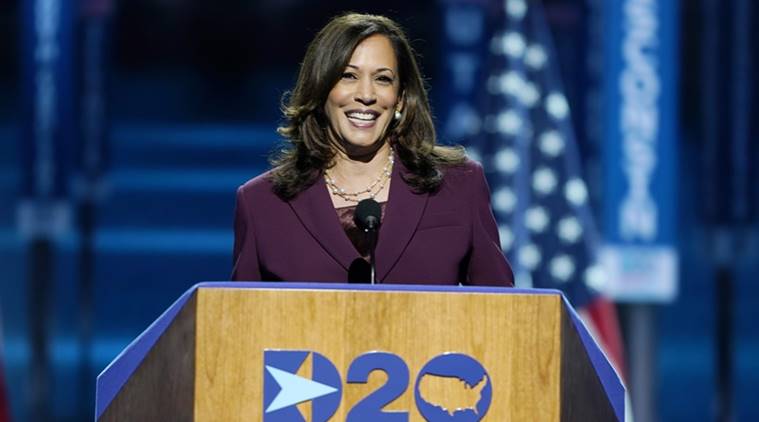 Democratic vice-presidential candidate Sen. Kamala Harris, D-Calif., speaks during the third day of the Democratic National Convention, Wednesday, Aug. 19, 2020, at the Chase Center in Wilmington, Del. (AP Photo/Carolyn Kaster)
Democratic vice-presidential candidate Sen. Kamala Harris, D-Calif., speaks during the third day of the Democratic National Convention, Wednesday, Aug. 19, 2020, at the Chase Center in Wilmington, Del. (AP Photo/Carolyn Kaster)
Long after the particular intensity of the early ’60s passed, the community it created endured.
‘I Had to Go There’
For decades, the brightest students from British colonies like Jamaica and India had been sent, by reflex, to Britain to pursue advanced degrees. But Donald Harris and Gopalan were different. Each had a compelling reason to want an American education.
In Gopalan’s case, the trouble was that she was a woman.
Gopalan, the oldest child in a high-achieving Tamil Brahmin family, wanted to be a biochemist. But at Lady Irwin College, founded by the British to provide an education in science to Indian women, she had been forced to settle for a degree in home science.
“My father and I used to tease her like nobody’s business,” said her brother, Gopalan Balachandran.
His sister died in 2009. But in retrospect, he realizes she must have been seething.
Read | Kamala Harris ‘not competent’ to be US president, says Trump
But she had a plan: In America — unlike India or the United Kingdom — it was still possible to apply for a degree in biochemistry, her brother said. And she had been admitted to the University of California at Berkeley.
Eight thousand miles away, in 1961, something similar occurred with Harris, who was seeking a doctorate in economics.
When he was awarded a prestigious scholarship granted by the British colonial government, it was assumed he would study in Britain, like the recipients who had preceded him.
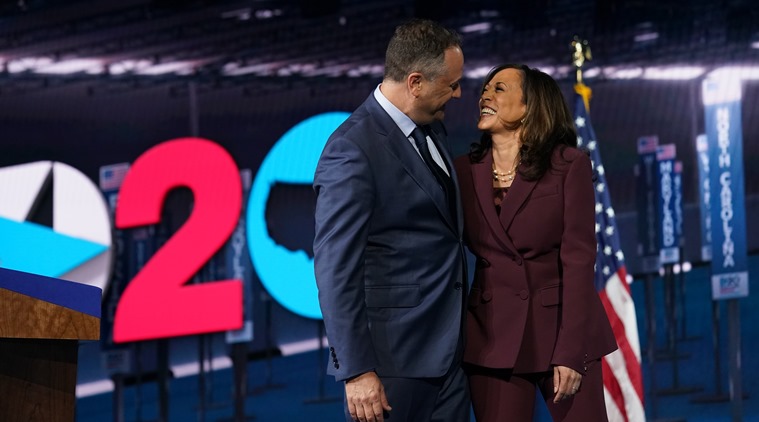 Sen. Kamala Harris (D-Calif.) is joined by her husband, Douglas Emhoff, after accepting her party’s vice-presidential nomination during the Democratic National Convention in Wilmington, Del., on Wednesday, Aug. 19, 2020. (Erin Schaff/The New York Times)
Sen. Kamala Harris (D-Calif.) is joined by her husband, Douglas Emhoff, after accepting her party’s vice-presidential nomination during the Democratic National Convention in Wilmington, Del., on Wednesday, Aug. 19, 2020. (Erin Schaff/The New York Times)
But Harris didn’t want to go to Britain. He began to see, he said, how Britain’s “static rigidity of pomp, ceremony and class” had been transplanted onto plantation society in Jamaica.
UC Berkeley had come to his attention in a news story about student activists traveling to the South to campaign for civil rights.
“Further investigation of information about this university convinced me I had to go there,” he said.
Finding a Group
Shyamala Gopalan fell into important friendships at Berkeley right away.
As she stood in line to register for classes, in the fall of 1959, the person standing behind her was Cedric Robinson, a Black teenager from Oakland.
In 1960, there were fewer than 100 Black students in a student body of 20,000, historian Donna Murch wrote in her book “Living for the City: Migration, Education and the Rise of the Black Panther Party.”
Read | Trump has shown reckless disregard for well-being of American people: Kamala Harris
Robinson, whose grandfather had fled Alabama in the 1920s to escape a lynching, was the first in his family to enroll in college.
The woman in front of him made an impression. Gopalan, his elder by two years, often wore a sari in those days, and acquaintances said they thought she came from royalty; that’s how she carried herself. When Robinson stepped up to the desk, the registrar assumed he was a graduate student from Africa and asked, politely, if his country was also paying his tuition.
Robinson, who died in 2016, thought that was hilarious, said historian Robin D.G. Kelley. He would tell that story over the years as he went on to earn a master’s and a doctorate, then tenure at the University of California at Santa Barbara. He and Gopalan would form a lifelong friendship.
They would both become part of a Black intellectual study group that met in the off-campus house of Mary Agnes Lewis, an anthropology student.
The group, later known as the Afro American Association, was “the most foundational institution in the Black Power movement,” said Murch, who devoted two chapters to it in her book.
This was no casual book club. Reading was assigned, and if you failed to keep up with it you would pay. At one discussion on existentialism, community college student Huey Newton — the future co-founder of the Black Panther Party — was chastised for not having done the reading, recalled Margot Dashiell, 78, who went on to become a sociology professor at Laney College.
“He came back the next time and he was fully prepared,” she said.
The group would later limit its membership to people of African descent, refusing admission to the white partner of a Black member, Murch wrote.
But as a former colonial subject and a person of color, there was no question that Gopalan belonged, other members said in interviews.
“She was part of the real brotherhood and sisterhood; there was never an issue,” said Aubrey LaBrie, who went on to teach courses on Black nationalism at San Francisco State University. “She was just accepted as part of the group.”
In 1961, when Harris arrived on campus, he, too, fell in with the study group right away.
It was in that company, in the fall of 1962, that he met his future wife. “We talked then, continued to talk at a subsequent meeting, and at another, and another,” he said. The following year they were married.
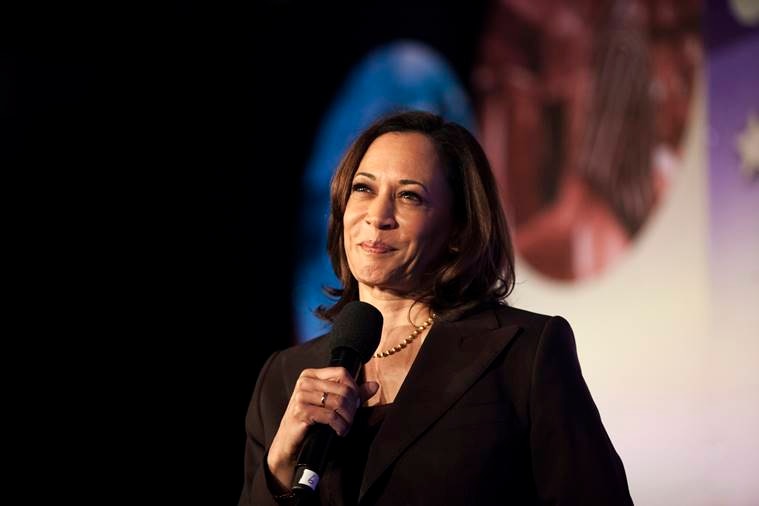 FILE — Sen. Kamala Harris (D-Calif.), then a candidate for president, campaigns in Los Angeles on Oct. 4, 2019. Former Vice President Joe Biden, the presumpive Democratic presidential nominee, selected Harris as his vice-presidential running mate on Tuesday, Aug. 11, 2020. (Jenna Schoenefeld/The New York Times)
FILE — Sen. Kamala Harris (D-Calif.), then a candidate for president, campaigns in Los Angeles on Oct. 4, 2019. Former Vice President Joe Biden, the presumpive Democratic presidential nominee, selected Harris as his vice-presidential running mate on Tuesday, Aug. 11, 2020. (Jenna Schoenefeld/The New York Times)
Protests around civil rights were a big part of the young couple’s life. In her speech at the Democratic National Convention last month, Kamala Harris said that her parents “fell in love in that most American way — while marching together for justice in the civil rights movement of the 1960s.”
‘Those Ties Became the Village’
By the time the couple’s first child, Kamala, was born in 1964, political tides had begun to shift again.
The Harrises’ marriage would fray as Harris took short-term teaching positions at two different universities in Illinois. When he won a tenure-track position at the University of Wisconsin, Gopalan Harris settled, instead, with her children in Oakland and West Berkeley.
Read | Kamala Harris to counter President Trump’s convention speech
Harris’ career would flourish. A left-wing critic of neoclassical economic theory, he was a popular professor and became the first Black scholar to receive tenure in Stanford’s economics department. But a deep freeze had settled in the marriage.
Gopalan Harris, a research scientist who published influential work on the role of hormones in breast cancer, filed for divorce in 1972. The split left her so angry that, for years, she barely interacted with Harris.
Into the vacuum stepped Gopalan Harris’ old friends, connections from the Berkeley study group.
A web of support — from day care, to church, to godparents and piano lessons — radiated out from the Afro American Association.
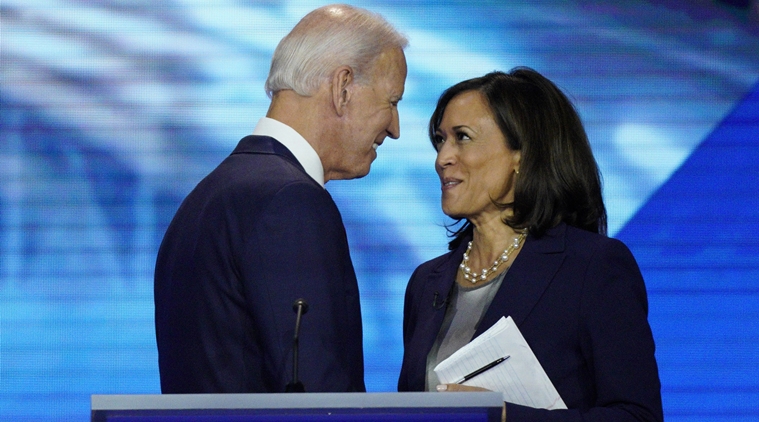 FILE – In this Sept. 12, 2019, file photo, Democratic presidential candidate former Vice President Joe Biden, left, and then-candidate Sen. Kamala Harris, D-Calif. shake hands after a Democratic presidential primary debate hosted by ABC at Texas Southern University in Houston. Biden has chosen Harris as his running mate. (AP Photo/David J. Phillip, File)
FILE – In this Sept. 12, 2019, file photo, Democratic presidential candidate former Vice President Joe Biden, left, and then-candidate Sen. Kamala Harris, D-Calif. shake hands after a Democratic presidential primary debate hosted by ABC at Texas Southern University in Houston. Biden has chosen Harris as his running mate. (AP Photo/David J. Phillip, File)
“Those ties became the village that supported her in rearing the children,” said Dashiell, the sociology professor who was a member of the discussion group. “I don’t mean financially. They surrounded those children.”
LaBrie introduced Gopalan Harris to his aunt, Regina Shelton, who ran a day care center in West Berkeley. Shelton, who had been born in Louisiana, became a pillar of the young family’s life, eventually renting them an apartment upstairs from the day care center.
There was always a snack and a hug at Shelton’s. If it got too late, the sleepy children would go to bed at her house, or Shelton would send her daughters to tuck them in at home.
In the years since, Kamala Harris has often reflected that her immigrant mother’s chosen family — Black families one generation removed from the segregated South — powerfully shaped her as a politician. When she took the oath of office to become California’s attorney general, and then a U.S. senator, she asked to lay her hand on Shelton’s Bible.
“In office and into the fight,” she wrote in an essay last year, “I carry Mrs. Shelton with me always.”
📣 The Indian Express is now on Telegram. Click here to join our channel (@indianexpress) and stay updated with the latest headlines
For all the latest World News, download Indian Express App.
[ad_2]
Source link